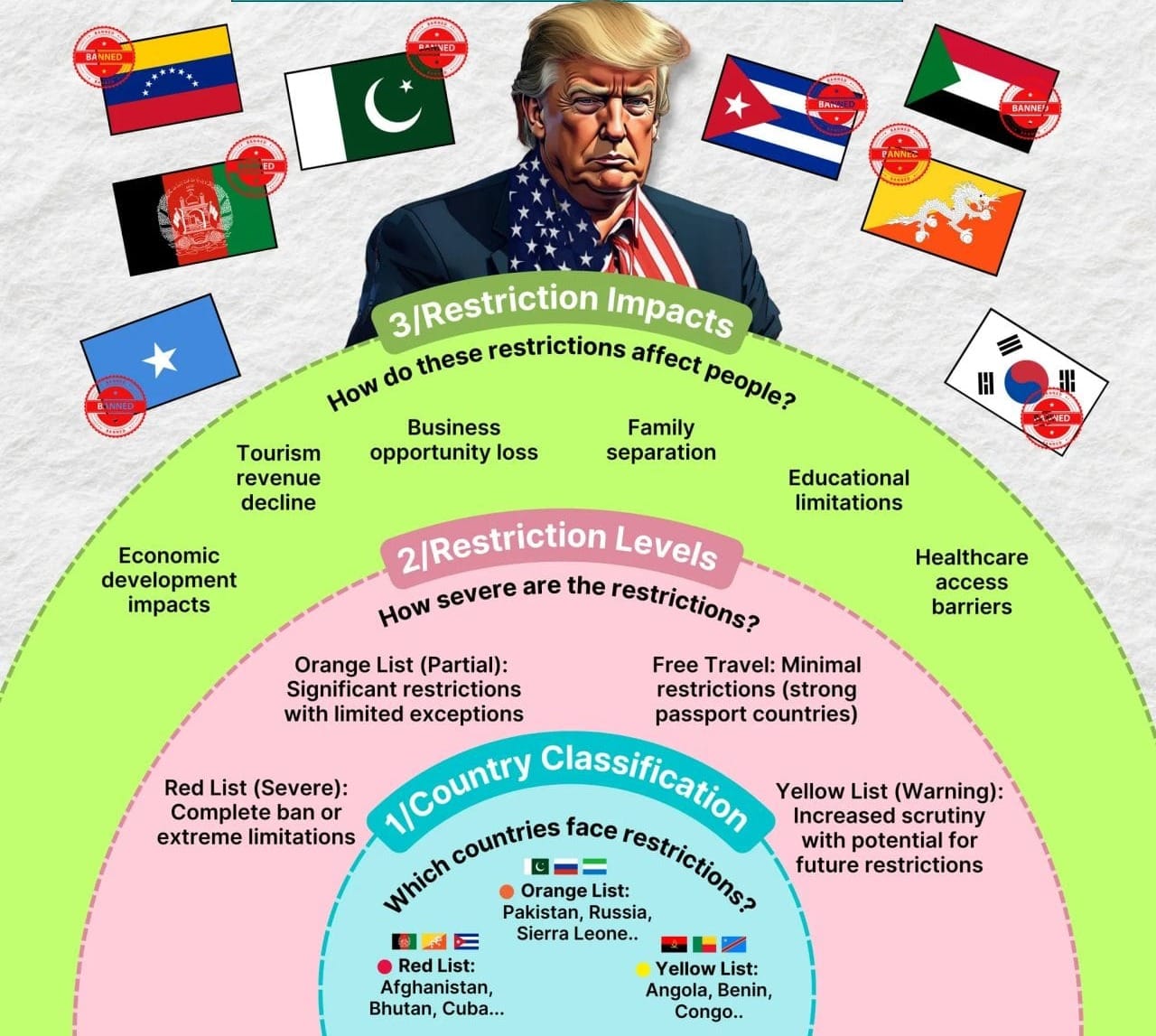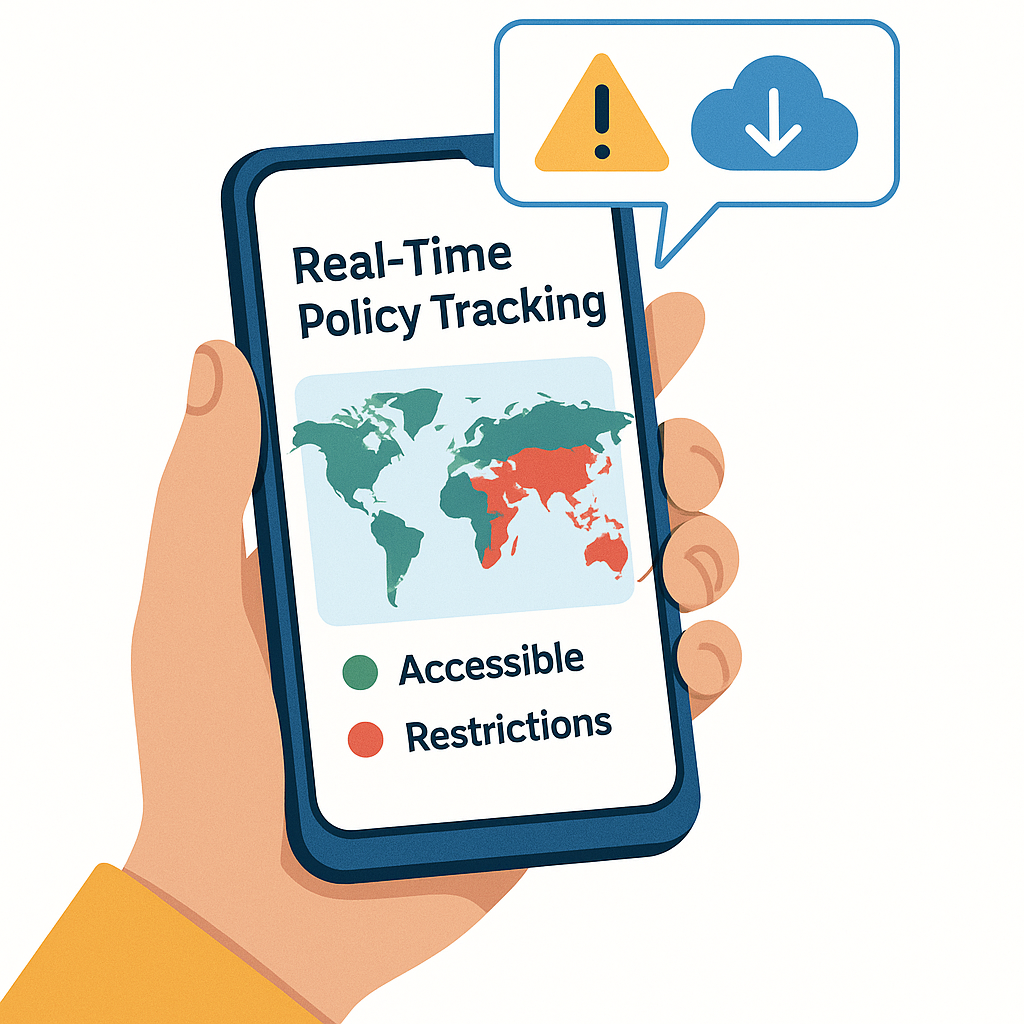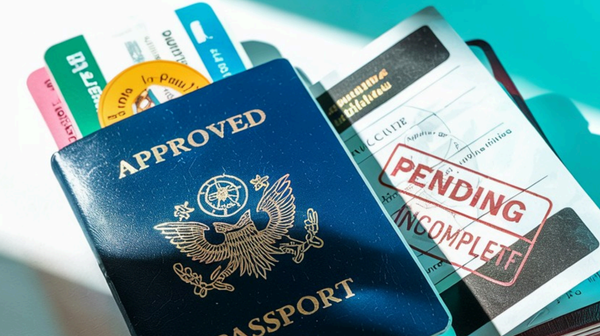Trump’s New Travel Ban: Navigating the Impact on Visa-Dependent Travellers

Introduction:
Travel restrictions are tightening once again, with former U.S. President Donald Trump proposing a sweeping new travel ban that could affect dozens of countries. This development marks one of the most significant visa policy updates in recent years – a move poised to disrupt travel plans for thousands of people. For visa-dependent travellers – those from weak-passport countries who require visas for international travel – the implications are especially profound. In this report, we break down what Trump’s new travel ban entails, how it differs from past policies, and what it means for global mobility. We’ll focus on practical guidance for travellers from affected nations, including alternative destinations and routes, and highlight how Propellus’ tech-driven solutions can help navigate these complex travel restrictions. The goal is a professional yet accessible analysis, blending facts and insight to empower travellers in an era of increasing barriers.
Overview of Trump’s New Travel Ban

What is happening?
The Trump administration is considering a new travel ban that would extend far beyond the notorious 2017 “Muslim ban.” According to news reports, the plan could impact citizens of over 40 countries – a dramatic expansion from the previous ban. A leaked memo suggests the policy will divide targeted countries into three tiers of restriction:
- Full Visa Suspension (Tier 1): Roughly 10 countries (including Afghanistan, Iran, Syria, Cuba, North Korea and others) would see a complete halt of U.S. visa issuance. Nationals of these countries would be barred from travelling to the United States for any purpose – whether tourism, business or study.
- Partial Visa Suspension (Tier 2): A second cluster of 5 countries – for example, Eritrea, Haiti, Laos, Myanmar, and South Sudan – would face partial restrictions. This likely means certain visa categories (like tourist or student visas) are paused or subject to heavier scrutiny, with some exceptions possible for diplomats or special cases.
- Probationary Period (Tier 3): A much larger group of around 25–26 countries, including nations such as Belarus, Pakistan, and Turkmenistan, would be placed on a 60-day “watch list”. During this period, these governments must “improve” their security and information-sharing procedures. If they fail to satisfy U.S. vetting standards, they could also face visa issuance suspensions after the deadline.
Why these countries?
U.S. officials have framed the policy as a security measure. The targeted nations are accused of “deficient” vetting and screening procedures for their travellers. In plain terms, the U.S. government claims it cannot sufficiently verify the identities and backgrounds of visa applicants from these places due to limited data or cooperation. Many of the listed countries were also on prior U.S. travel blacklists or have ongoing security concerns. Notably, while several are Muslim-majority (echoing the original Muslim ban), the new list also includes non-Muslim countries like North Korea, Belarus, and Cuba, indicating the criteria extend beyond religion. The inclusion of countries like Haiti and Eritrea, which were not part of the 2017 ban, underscores that this policy casts a wider net than before.
Is it official yet?
As of this writing, the travel ban is still a proposal under review, not yet fully enacted. It requires final sign-off from top U.S. officials (including the Secretary of State). However, an executive order signed on 20 January 2025 already directed agencies to identify countries for “partial or full suspension” of visas, and the leaked list is the outcome of that directive. If and when the ban is approved, implementation could be swift. Travellers should assume these restrictions might come into force imminently and plan accordingly. Propellus keeps a close eye on such policy updates and will alert users and partners as changes become official, helping travellers stay informed in real time.
Why It Matters for Visa-Dependent Travellers

This proposed ban carries serious implications for visa-dependent travellers – people whose passports do not grant them visa-free mobility to most destinations. For these individuals, international travel is already a complex dance of paperwork, fees, and approvals. A blanket ban adds another layer of hardship, effectively slamming the door on a major destination.
Consider that many countries on the U.S. ban list rank among the world’s weakest passports in terms of travel freedom. For example, Afghanistan’s passport allows visa-free access to only about 26 countries. Syria, Yemen, and Somalia are not far behind at under 35 visa-free destinations. By contrast, citizens of strong passports like the UK or Singapore enjoy visa-free travel to over 180 countries. This stark gap means an Afghan or Sudanese traveller must apply for visas nearly everywhere they go – a process that is time-consuming, expensive, and often uncertain. Propellus, which serves travellers from exactly these weak-passport nations, is intimately aware of the challenges they face. Our mission is to bridge the global mobility gap by simplifying visa processes and providing up-to-date information so that travellers aren’t left stranded by sudden policy shifts.
The human impact:
A sweeping travel ban translates into immediate travel disruptions. Families with members in the U.S. could be cut off from loved ones, unable to visit for holidays, weddings, or even emergencies. Students from, say, Myanmar or Eritrea who secured admission to U.S. universities might find themselves unable to take up their offers if student visas are halted. Business professionals from Pakistan or Belarus could be forced to cancel important trips, losing opportunities to network or close deals. Even tourists planning long-awaited visits to American landmarks would have to shelve their plans. In short, countless personal and professional plans are thrown into limbo.
Beyond individual plans, there is a broader economic impact. Countries that implement such bans often experience reciprocal measures or simply lose out on visitors. By making the U.S. “harder to visit or do business”, the policy risks diverting travellers (and their spending) to other countries. Fewer international visitors mean lost tourism revenue for the U.S. economy – a concern even U.S. travel industry leaders have raised. From the traveller’s perspective, however, this economic argument is little consolation for being denied a trip. These travellers are more likely to change course to friendlier destinations rather than give up on travelling altogether.
Psychological toll:
There’s also an intangible cost on visa-dependent communities. Such bans send a message (intended or not) that travellers from certain countries are not welcome. This can foster anxiety and a sense of stigmatization. Many genuine travellers who go through all the proper visa channels may feel frustrated and unwelcome, as if all their effort was for nothing. Propellus hears these concerns from our users regularly – travellers who follow the rules, prepare diligently for visa interviews, and still worry that policies will change overnight. This is why we emphasise empathy and support in our services, ensuring that travellers know someone is in their corner helping them navigate the uncertainties.
From Past Bans to Present Restrictions: A Changing Landscape
Trump’s new travel ban doesn’t emerge from a vacuum – it’s part of a pattern of increasing travel restrictions in recent years. To understand the significance, let’s briefly revisit history:
- 2017 “Muslim Ban”: In his first term, President Trump stunned the world by banning entry for citizens of seven predominantly Muslim countries right after taking office. That initial executive order (and a follow-up version) targeted nations like Iran, Iraq, Syria, Libya, Yemen, Sudan, and Somalia. Chaos erupted at airports; families were detained or sent back despite valid visas. Courts intervened to block parts of the ban, leading to revisions. Eventually, a slimmed-down version of the ban was upheld by the U.S. Supreme Court in 2018. It remained contentious, seen by critics as discriminatory, though the administration argued it was for security. In 2020, the ban was expanded to additional countries such as Nigeria, Myanmar, and Kyrgyzstan (focusing mostly on immigrant visas). The ban was finally revoked in 2021 by President Biden, restoring travel for those nationals. However, the legacy of uncertainty lingered for visa-dependent travellers worldwide.
- The 2025 Proposal – Broader in Scope: Now, Trump’s new proposal goes even further. Instead of ~13 countries, it eyes over 40 countries across Africa, Asia, and the Americas. The inclusion of non-Muslim-majority countries like North Korea, Belarus, and Cuba signals that the rationale has broadened to “national security” in a more general sense. In effect, this is not just a religious or regional ban, but a global one, touching roughly one-fifth of the world’s nations. During Trump’s first term, various immigration restrictions (the travel ban and others) would have affected nearly two-thirds of legal immigrants to the U.S. if fully implemented. The new plan casts an even wider net, potentially reshaping travel and immigration flows for years to come.
- Global trend of travel vigilance: It’s worth noting that the U.S. is not alone in tightening entry rules. In recent years, concerns about security, pandemics, and irregular migration have prompted many countries to bolster their border controls. Europe, for instance, is rolling out the ETIAS system (a visa-waiver pre-screening) and the UK is introducing an ETA requirement – these aren’t bans, but they do add steps for travellers who were previously visa-exempt. Meanwhile, countries like Australia and Canada regularly update their visa screening procedures as well. For travellers from weak-passport countries, this trend means constant adaptation. The era of breezing through borders is still a distant dream for them; instead, every trip requires careful research and compliance with evolving rules. This underscores the importance of visa policy updates – staying on top of changes is now a critical part of trip planning.
Security vs. openness:
Governments often struggle to balance security with openness. As noted in a Propellus analysis, governments actually want to say “yes” to more visas, to welcome tourists and investors, but outdated systems and trust deficits make them cautious. They worry about inadequate data and verification, which leads to blunt instruments like blanket bans. The new U.S. travel ban is a prime example of prioritising security concerns at the expense of openness. Propellus is actively working on the other side of that equation – giving governments better tech tools to vet applicants (through secure data and automation) so that genuine travellers don’t get caught in broad restrictions. Our vision of “reducing the gap between weak and strong passport holders’ travel experience” drives us to collaborate on solutions that could eventually render such bans unnecessary. In the meantime, however, travellers must navigate the landscape as it is, with caution and informed planning.
Practical Guidance for Travellers Affected by the Ban
For travellers in countries potentially affected by Trump’s new ban, the situation can be unnerving. Plans may need to change, but with the right approach you can still achieve your travel goals (or at least avoid wasting time and money). Here are some practical tips to navigate travel restrictions in this uncertain period:

- Stay Informed: Knowledge is your first line of defence. Keep up with official updates and news about the ban’s status. Policy changes can unfold quickly, so regularly check trusted news sources and government announcements. Propellus users receive timely alerts on major visa policy updates – a valuable feature to ensure you don’t miss changes that affect your plans. Subscribing to Propellus or similar services can give you an early warning if, for example, your home country moves from the “probationary” list to a full ban.
- Review Existing Visas: If you already hold a valid U.S. visa and are from a country on the list, be aware that your visa’s validity could be in jeopardy. In previous instances, some travel bans led to visas being provisionally revoked. As of now it’s unclear whether existing visa holders will be exempt from the new ban. To avoid a harsh surprise at the airport, contact the U.S. embassy or consulate for guidance on the status of your visa. Until there is clarity, you might consider postponing non-essential travel to the U.S. even if you have a visa, because you could be denied entry upon arrival if rules change last-minute.
- Consider Alternate Destinations: If the U.S. was on your travel itinerary (for work, study or leisure) and you’re now blocked, look for alternative destinations to fulfill those purposes. For instance, students might explore universities in Canada, the UK, or Australia, which – while having their own visa processes – remain open to many nationalities. Business meetings or conferences could be moved to neutral locations (Dubai, Singapore or Istanbul, for example, often welcome visitors from a wide range of countries). Tourists who dreamed of U.S. attractions can find comparable experiences elsewhere: can’t go to Disney World in Florida? Perhaps visit Disneyland Paris or Tokyo Disney; blocked from the Grand Canyon? Consider the spectacular vistas of the Himalayas or the Alps. It’s about being flexible. Propellus can assist here by highlighting destinations that are visa-friendly for your nationality. Our platform can instantly show you which countries you can visit visa-free or with a simple e-visa, helping you pivot your travel plans to places where you’re welcome.
- Adjust Travel Routes: For those who must travel, careful routing is vital. Avoid transiting through U.S. airports if you are from a banned country – you won’t be allowed even for a connection without a valid visa, which the ban would invalidate. Choose routes through Europe, the Middle East or Asia instead. Similarly, if you’re flying from an unaffected country but hold a weak passport, double-check transit visa requirements; some countries require transit visas for certain nationalities. Planning your journey with an experienced travel agent or using Propellus’s itinerary tools can help ensure you don’t accidentally route through a country that will deny you boarding. One helpful Propellus feature for agents is the ability to see all visa requirements in one dashboard – so if one route becomes impossible, agents can quickly find another that works and secure any needed visas in a snap.
- Ensure Documentation & Compliance: In times of stricter screening, make sure all your travel documents are in order. This includes having a valid passport (with plenty of validity remaining), any secondary IDs, and supporting documents for your trip (invitation letters, travel itineraries, proof of funds, etc.). Even if you’re not headed to the U.S., other countries might become more cautious when a major power enacts a ban, meaning border officers everywhere could ask more questions. Being prepared with documentation can smooth your entry elsewhere. Also consider travel insurance that covers unexpected trip cancellations or changes – while it won’t override a ban, it might help recoup costs if you have to cancel flights or hotels.
- Leverage Tech Solutions: Finally, use technology to your advantage. Beyond news alerts, platforms like Propellus are designed to streamline visa processes and keep travellers updated. For example, if you need to quickly apply for a visa to a different country (because your U.S. trip was derailed), Propellus can expedite that by auto-filling applications, managing the required documents digitally, and coordinating appointments. Our secure data locker stores your passport and prior visa info, making it easy to re-purpose for new applications. In short, let technology reduce the stress of bureaucratic processes so you can focus on adjusting your plans effectively.
By following these steps, travellers can maintain a degree of control over their journey, even as rules change around them. The key is flexibility and information – two things that, fortunately, are more accessible now than ever. Propellus is committed to providing both, so that no traveller is left completely stranded by a policy change.
Propellus: Empowering Global Mobility Amid Increasing Restrictions
In a world where travel rules seem to change by the day, Propellus stands out as a beacon for visa-dependent travellers and the travel industry alike. Propellus is a travel-tech company focused on automating and simplifying visa processing – essentially acting as a bridge between travellers with weak passports and the destinations they aspire to visit. Here’s how Propellus brings value in the context of bans and ever-shifting regulations:
- One-Stop Visa Solutions: Propellus offers a one-window platform where travellers (or their travel agents) can handle visa applications for multiple countries in one place. Instead of juggling different embassy websites and paper forms, you can use Propellus to apply for visas with just a few clicks. This is especially useful if a sudden ban forces you to change your plans – for instance, you pivot from a U.S. trip to a European trip. With Propellus, you can quickly find the visa requirements for, say, the Schengen Area or UK, and start the application process without missing a beat.

- Real-Time Policy Tracking: Our system continuously monitors visa policy updates and travel advisories. When a major change occurs – like a new travel ban, new quarantine rules, or a change in visa-on-arrival availability – Propellus updates its database immediately. We also send out alerts and have a knowledge base to answer travellers’ questions about such changes. This means you’ll know which countries are accessible and what conditions apply, empowering you to make informed decisions. In the case of Trump’s travel ban, Propellus would promptly update the status of U.S. visa services for affected nationalities, so users aren’t left guessing.
- AI-Powered Risk Assessment: Propellus’s technology isn’t just reactive; it’s proactive. We utilise AI-driven tools to assess visa applications for completeness and compliance, minimising the risk of rejections or delays. In an era of heightened scrutiny, a perfectly prepared application can make the difference between approval and refusal. By catching errors or missing info before submission, Propellus increases travellers’ chances of success elsewhere, which is crucial if options are limited. Our platform essentially helps “trust-build” with visa officers by ensuring applications meet all requirements – a direct way to tackle the trust deficit that often underlies broad travel bans.
- Partnering with Travel Agents and OTAs: Propellus also empowers travel agents and online travel platforms to better serve visa-dependent customers. Through our APIs and dashboards, an agent can seamlessly add visa assistance to a client’s travel booking. For example, if a client from a banned country decides to visit an alternative destination, the agent can instantly initiate the necessary visa process via Propellus. This level of integration not only saves time but also adds reassurance for the traveller that all bases are covered. In a competitive travel market, such service is a game-changer – turning what could be a lost booking (due to a ban) into a salvaged trip to a different place.
- Commitment to Weak-Passport Holders: Above all, Propellus is driven by a vision of equalising global mobility. We believe that where you were born should not dictate how easily you can explore the world. Every new restriction – be it a travel ban, a stricter visa rule, or a bureaucratic hurdle – is motivation for us to innovate further. Whether it’s simplifying the application interface, adding more countries to our e-visa list, or partnering with governments to modernise visa systems, Propellus is at the forefront of making travel more accessible. In these challenging times, we want weak-passport travellers to feel that they have an advocate and a solution provider on their side.
In summary, Propellus provides the tools and support to navigate an era of travel bans and visa complexities. While we can’t control geopolitical decisions, we can control how we respond – with agility, information, and technology. Our users can confidently adapt their travel plans knowing Propellus will streamline the logistics and keep them informed. Global mobility may be facing headwinds, but with the right support, determined travellers can still find a way forward.
Q&A: Addressing Common Concerns
Finally, let’s address some common questions travellers have about the new travel ban and related issues:
Q: Is Trump’s new travel ban in effect right now?
A: Not at the moment of writing. The ban is proposed and under review, but not yet fully approved. The administration is expected to finalise the details soon (the leaked memo suggests a proposal was due by late March 2025). It’s wise to assume it will take effect in some form. Keep an eye on official announcements in the coming weeks. Propellus will also update its advisories as soon as there is confirmation. If you plan to travel to the U.S. and your home country is on the draft list, consider postponing your trip until there’s clarity.
Q: I already have a valid U.S. visa (or an approved travel ESTA). Can I still use it?
A: It depends on the final rules. In earlier travel bans, people with valid visas were initially caught up in the chaos, though later exemptions were made. For this new ban, it’s uncertain – there are indications that even existing visas might be cancelled or suspended for certain countries. If your country ends up in the full suspension category, your visa could be rendered void. If you’re in a partial suspension or probation category, your visa might remain valid, but future renewals could be affected. If you’re already in the U.S. on a visa, you likely won’t be deported, but avoid leaving the U.S. because re-entry might be barred. We recommend contacting an immigration attorney for personalized advice if you’re in this situation. And again, stay tuned to updates – the policy could explicitly clarify treatment of current visa holders.
Q: What about U.S. green card holders?
A: Generally, lawful permanent residents (green card holders) from the affected countries should not be subject to the travel ban. Green cards confer a legal right to live in the U.S. that is usually protected. Early reports suggest green card holders will be exempt from the new ban. However, they might face extra scrutiny at entry (for example, more questioning or secondary inspection), especially if they have ties to any flagged activities. If you are a green card holder from a listed country, carry proof of your status at all times when traveling and consider consulting with an immigration advisor before international travel, just to be safe.
Q: If I have dual citizenship (two passports) and one is from a banned country, can I use my other passport to travel?
A: In the previous Trump-era ban, dual citizens could often circumvent the restrictions by using a non-banned passport. For instance, an individual born in Iran but holding a second passport from, say, Canada or the UK could enter the U.S. on the Canadian/British passport. It’s very likely the same logic will apply in the new ban – the restriction is typically based on the passport you present when you travel. But caution: you must genuinely have dual citizenship; it’s not about visas or residence permits, but an actual second passport from an unaffected country. And you should only travel on one passport – don’t try to switch passports mid-journey as that can cause its own issues. Always ensure that any ESTA or visa you apply for is tied to the passport you will use for entry. If you do hold dual citizenship, this is a good fallback, albeit one not everyone has.
Q: Why are these specific countries targeted? Is this a “Muslim Ban” again?
A: The official reasoning is that these countries have inadequate security and identity verification practices. Essentially, the U.S. claims it cannot trust the travel documents or background information from these governments, which could let bad actors slip through. Many of the countries on the list are indeed majority-Muslim (e.g. Afghanistan, Iran, Somalia, Sudan, Yemen, etc.), which does draw parallels to the 2017 Muslim Ban. Critics argue that the policy unfairly stigmatizes Muslim and developing nations. However, the inclusion of countries like North Korea, Belarus, and Venezuela suggests the criteria also involve geopolitical disputes and other security concerns, not religion alone. For example, North Korea and Cuba have long been isolated by U.S. sanctions, and Belarus is cited for governance issues. So, while the ban’s impact will be felt heavily by Muslim travellers, it’s presented as a broader national security measure rather than explicitly a religious ban.
Q: Could more countries be added to the ban?
A: It’s not impossible. The current review identified around 40–43 countries of concern. While those are the ones in focus now, the executive order’s criteria (countries that don’t share information or have high risk travellers) could apply to others in the future. The ban also has a dynamic aspect: countries in the probation tier have 60 days to improve or else face being moved to the restricted list. Conversely, if a country makes significant improvements, it might avoid sanctions or even be removed from the list. Travellers from any country with a weaker passport or known security issues should stay vigilant, as travel policies (not just from the U.S. but globally) can tighten with little notice. In short, the list isn’t necessarily final; it could evolve.
Q: What alternative travel options do I have if I cannot go to the U.S.
A: The world is a big place, and not being able to go to the U.S. doesn’t mean you can’t travel at all. Alternative options will depend on your purpose:
- Tourism: Look for destinations that are welcoming to your nationality. Many countries in Asia, Africa, the Middle East, and Latin America offer visas on arrival or e-visas to travellers who often face strict checks elsewhere. For instance, if you hold a Nigerian passport (which faced restrictions in the past), places like Turkey, UAE, or Kenya might be great holiday alternatives with simpler entry requirements. Propellus can help you identify visa-free getaways or easy visas suited to your passport, as we’ve highlighted in our blog for various nationalities.
- Education: If your study plans in the U.S. are derailed, consider universities in countries known for embracing international students. Canada and the UK are popular, as are Germany, Turkey, Malaysia, and others depending on your field of study. Scholarships and quality programs exist worldwide. You may need to adjust to different application timelines and visa processes, but Propellus can assist in guiding you through, for example, the UK Tier-4 student visa or Canada’s study permit process.
- Business: Leverage international hubs. Can the meeting be done in a neutral country or virtually? Cities like Dubai, Singapore, London, or Cape Town often host conferences and business events precisely because they are accessible. If you were eyeing the U.S. market, perhaps engage partners or attend events in countries that are open – for example, meet European or Asian counterparts instead, or invite U.S. colleagues to meet in a location you can all travel to.
- Family Visits: This is the hardest to substitute, as nothing truly replaces seeing loved ones in person. If family in the U.S. cannot be visited, encourage them to meet you in a third country if possible. Even a short holiday together in a nearby country to the U.S. (like Mexico or the Caribbean, if those places allow your entry) could be an option, or somewhere in between geographically. If that’s not feasible, maintain connections through video calls and be ready to travel when restrictions ease. Keep all your documents (birth certificates, etc.) up to date in case any special travel parole is offered for family emergencies – the previous ban, for instance, had waivers (though hard to get) for family hardship cases.
Q: How does Propellus help travellers in this situation?
A: Propellus is designed to be a lifesaver for visa-dependent travellers during complicated times. Here’s how we can help you:
- Up-to-date Information: We provide a centralized source of truth on visa requirements and travel advisories. Instead of scouring dozens of websites, you can check Propellus for the latest status on where you can travel. For example, we’ll list that “U.S. visas – suspended for nationals of X country” and suggest alternatives.
- Visa Application Assistance: If you decide to travel elsewhere, Propellus streamlines the visa application for that new destination. Our system auto-fills your info across multiple applications, shows you the required documents, and even lets you track processing times. This efficiency is crucial when you’re making last-minute changes.
- Expert Support: While we’re a tech platform, we also have support teams familiar with visa regulations. We can’t change government rules, but we can clarify them for you. Unsure if you need a transit visa for a layover? Need help understanding a new requirement? Propellus’s support and resources (like our Travel Agent’s Guide and FAQ) are there to guide you.
- Peace of Mind: Perhaps the biggest benefit is knowing that you’re not navigating this alone. The world of visas and travel rules can be daunting, but Propellus’s entire purpose is to make it easier and less stressful. We empower you with the same tools and knowledge that professional travel agents use, right at your fingertips. In an era of travel bans and shifting sands, having Propellus is like having a dedicated visa expert in your pocket.
Conclusion:
Trump’s new travel ban represents a significant challenge for travellers from many developing countries. It highlights the ongoing divide in global mobility – a divide that companies like Propellus are determined to bridge. While policies may become more restrictive, travellers are not powerless. By staying informed, being flexible, and leveraging the right resources, visa-dependent travellers can continue to explore new horizons. Propellus is proud to support this community of global explorers. We believe that with the proper tools and information, borders are less of a barrier. Even in an age of bans and restrictions, the dream of global travel remains alive – and we’re here to help you navigate the journey.




